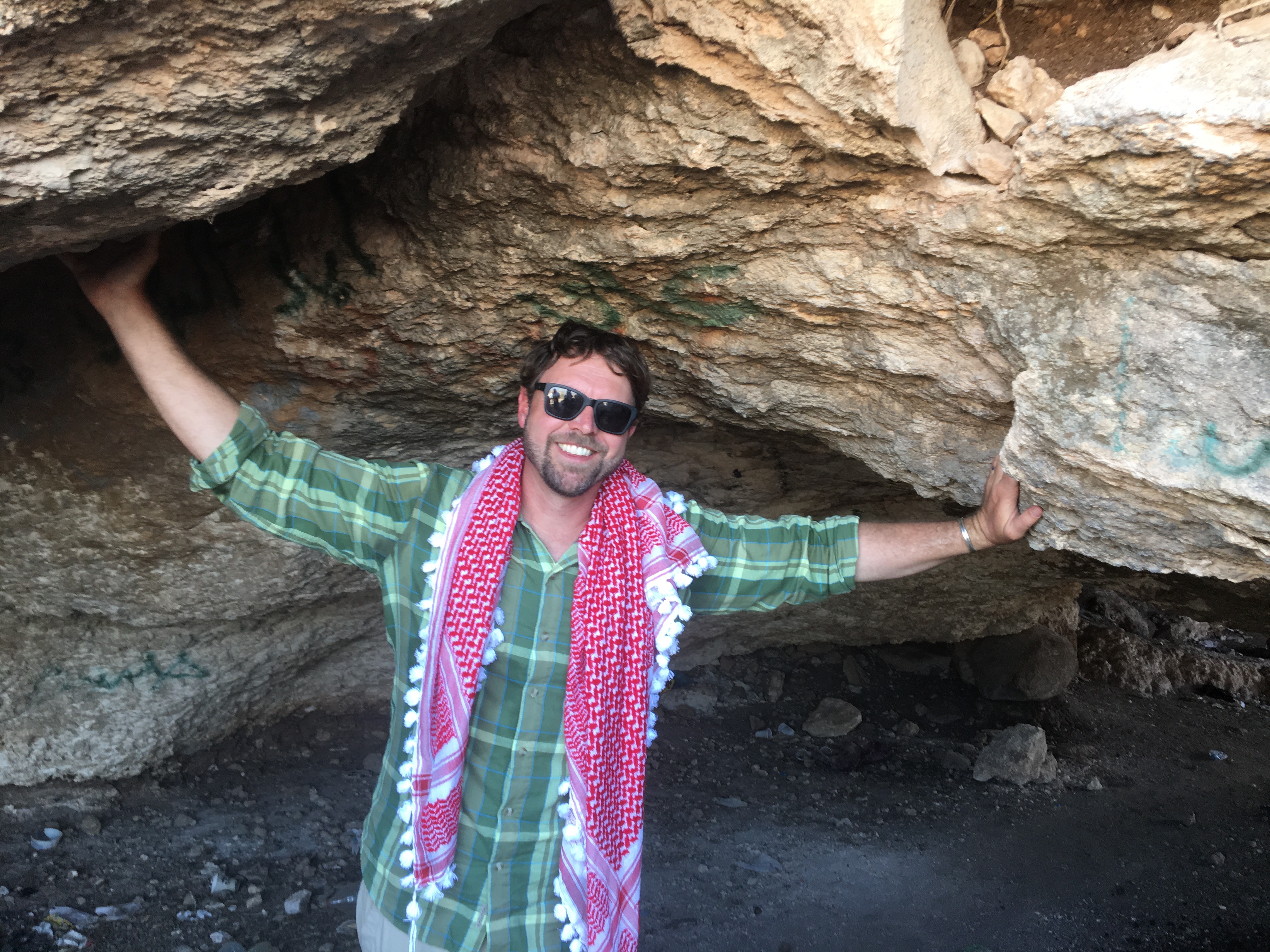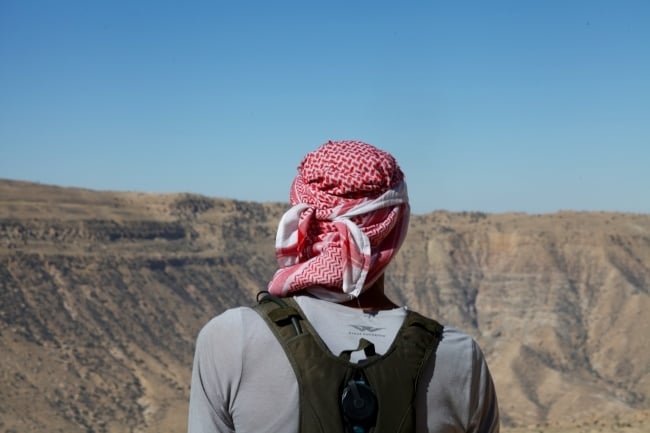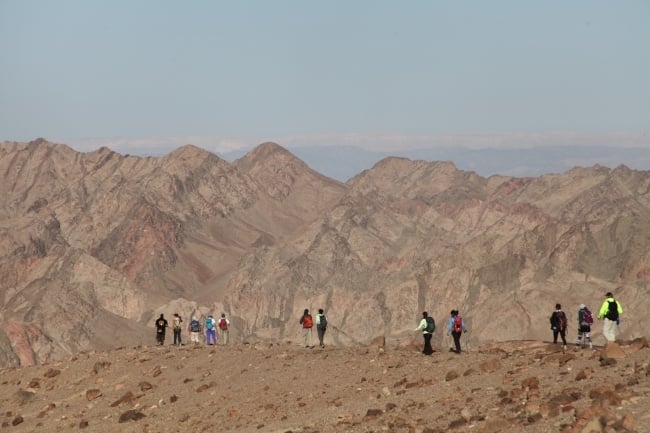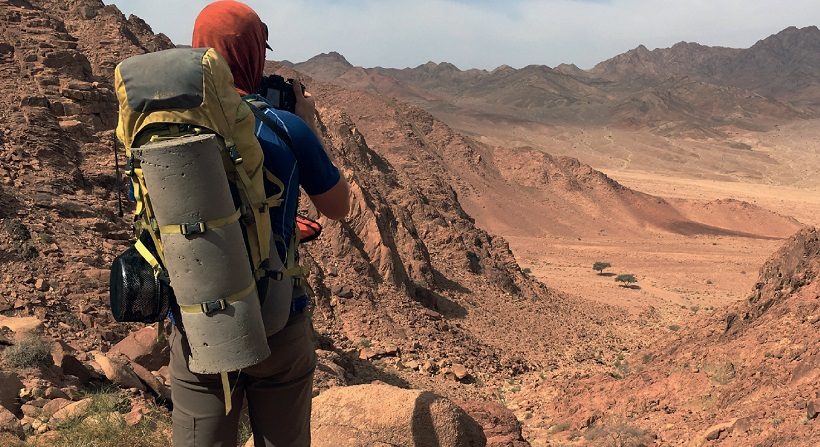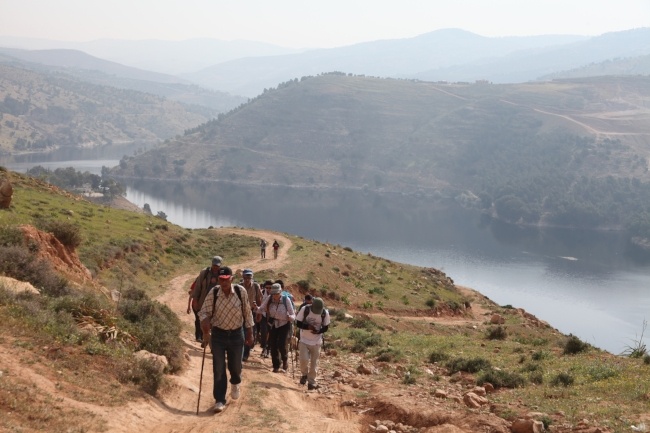
The Art of "No Thank You"
If we accepted every offer for tea, we would never finish hiking the Jordan Trail. Instead, we would still be somewhere back in Section One, halting our way across the stony landscape and never moving more than a half-kilometer without some shepherd of sheikh demanding we sit down and drink tea with them.
This is why, besides feeding me chalky lumps of dried yogurt for salt and energy, one of the most useful things the Mohammads have taught me is how to politely refuse an invitation for tea with this one useful syllable: "Eisht” they explained, forcing me to repeat it to the folks we passed along the way. It means something along the lines of, “Thank you—May God give you a long life.” Arabic seems to favor the hyperbole.
Now, when grown men or young boys call out from their tents, from the dark shade of a boulder, or from beneath a tree, our conversation goes something like this:
“Peace be upon you!” I say.
“The peace of God be upon you, my brother!” they reply with some enthusiasm. “Come drink tea! Eat with us!”
“Thank you! May God give you a long life!”
I have learned that it takes repeated doses of divinely-sanctioned longevity before they nod and politely smile, letting me off the hook--although they still shake their heads, as if I am missing out on their ultimate goodness.
Now I let the Mohammads decide when we stop for tea, which is usually when we run into one of their numerous relatives, or someone that is around their own age. The last time that happened was less than a kilometer from the high acropolis of Kerak—the symbolic halfway point on our journey across Jordan and an iconic tower of crusader architecture that we had been talking about for more than a week. There it was, high above us like a castle in the clouds, shining down rays of hope and the promise of rest, good food, and hot water.
No matter our closeness to the finish line for Section Four—Mohammad still stopped me, calling from a line of trees, pulling me away from the trail and introducing me to the young man laboring in the shade. I shook hands with Abu Karima, guessing him to be in his twenties, and accepted the hot glass of amber-hued tea, sipping deeply despite the intense heat of the day.
Real Bedouin tea tastes nothing like tea—it is extraordinarily smoky and sweet, enhanced by the flavors of the land—pinecones and the juniper wood from the fire, with wild mint, sage, and rosemary. Bedouin tea is an ever-changing concept that reflects the season, the time of day, and the drinker’s wants. Back in Wadi Mujib, when I was suffering from a funny tummy, Mohammad boiled me up a mug of urine-colored brew that tasted horrendous, but cured me within the hour. Only later did I discover that the herb was Artemisia or wormwood—the key ingredient of absinthe.
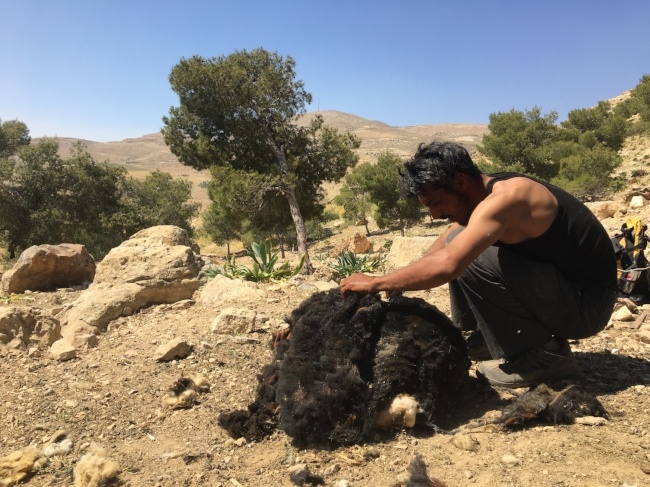
Now, near the end of a week’s journey, the Mohammads chatted while I sipped the shepherd’s smoky tea and lazily watched Abu Karima perform his job. First he grabbed an adult ram from the herd, dragging the sizable animal gently on the ground before binding up his four legs with a rope. Kneeling over it, he began to shear the sheep, clipping loudly at the greasy wool bundle and rolling away the mass of fur in the same way you might take off a winter coat.
Abu Karima and his wife left Syria back in 2010, right at the start of the war. They are not refugees by any definition, as they entered Jordan legally (with passports), but they simply never returned from whence they came. Now Abu Karima’s wife was pregnant with their second baby, and they were living in a tent just below Kerak Castle while he looked after his boss’s sheep. All the while his wife was explaining this, Abu Karima was moving the tied-up sheep from one position to the next and clipping away the many heavy pounds of wool. When he was finished, he made a final snip at the remaining fluff, then untied the lighter, sleeker ram which quickly dashed off to freedom.
“Naiman!” Mohammad shouted to the freshly-shorn sheep, and Abu Karima’s wife laughed out loud. Naiman (نعيماً) is what you say to someone who has just had a haircut or taken a shower—a kind of blessing you offer after someone has become clean. The word derives from the same root as the word for “paradise”, so that to me, it sounded like Mohammad was wishing paradise upon the sheep. Even Abu Karima chuckled and shook hands with us. We thanked the family for their hospitality, then waved for a long time as we hiked uphill, shouting farewell: “With Peace! With Peace!”
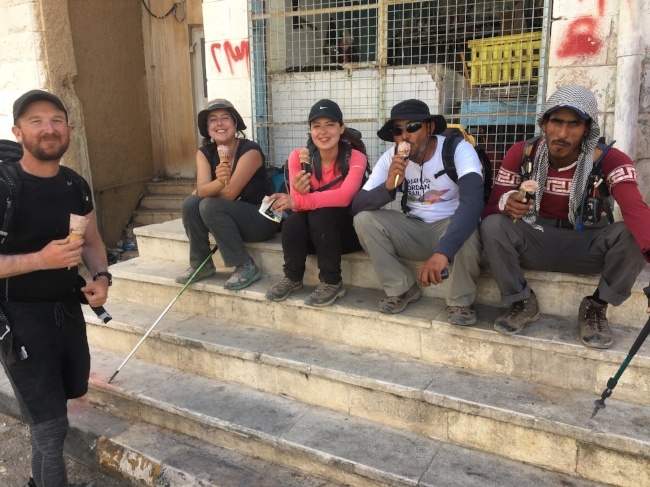
An hour later, our sweaty band of hikers had entered the ancient walled city of Kerak, all of us high-fiving one another and congratulating ourselves on finishing another section—and for finishing the first half of the Jordan Trail. We celebrated by ransacking the ice cream freezer of a local convenience store, then devouring the cold treats on the steps of an open-air poultry shop, impervious to the chicken butchering happening right behind us and wondering how bad we smelled as we watched the townspeople watch us.
“It’s all right,” Muna assured us. “We can sit here. This is my uncle’s neighborhood.” This seems to be how things work in Jordan—the country is like a funhouse maze of family relations, so that while most people tell you they are from Amman, they are actually from somewhere else. All it takes is dropping the right name and connecting the dots to that name and you’re in the clear. No less than three minutes into our ice cream and half a dozen of the men in the quarter had gathered around us, declaring their branch on Muna’s own family tree, all of them smiling and laughing with us. Suddenly we were locals, surrounded by neighbors and new friends, and all of them welcoming us to Kerak. This is precisely how I have managed to walk halfway across Jordan without ever being treated as a foreigner—it seems that merely walking alongside Jordanians brings me under this umbrella definition of family.
Beauty Is Pain
Thus, on our rest day in Kerak, my brothers from the trail—the Mohammads, Stuart of England, and our wily logistics man Sanad—all joined me on a trip to the barbers. After a month without shaving, my beard was getting hot and scratchy and just too long for comfort. I knew from experience that Jordanian barbers are masters at trimming and shaping beards—but they are also sadists who can make a grown man cry with nothing more than a twisted length of thread.
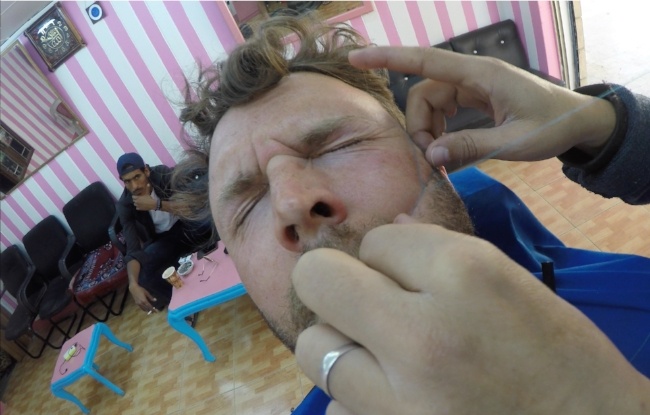
Threading is a special kind of torture, in which the groomer tears out the facial hair of the groomed by running tightly-pulled threads right over the skin. The result is a perfectly-edged beard with military-sharp angles, and in my case, a flushed appearance and ears that remain sensitive for many hours.
“Naiman!” said Mohammad, slapping me on the back when the pain was over. After so much time on the trail, I was washed, shaved, trimmed, and clean—ready for paradise, and with shapely eyebrows to boot!
But already, simply hiking the Jordan Trail feels like paradise. To walk these first 200 miles is a blessing; to be surrounded by nature all day and all night is wondrous; to go to sleep with the warm wind and the moon, to measure time by the reach of the mountains we hope to cross each day, and at dusk, to swim in chilled streams walled in by flowers that smell like birthday cake—all of it is too splendid for words typed on a screen. And even now, to spend a full day in Kerak, to explore the entirety of the castle, to stand on the ramparts and look nearly a mile straight down into the magnificent gaping chasm of earth that drops down the Dead Sea—all of it feels like a tremendous gift that can only be granted on this path across the land.
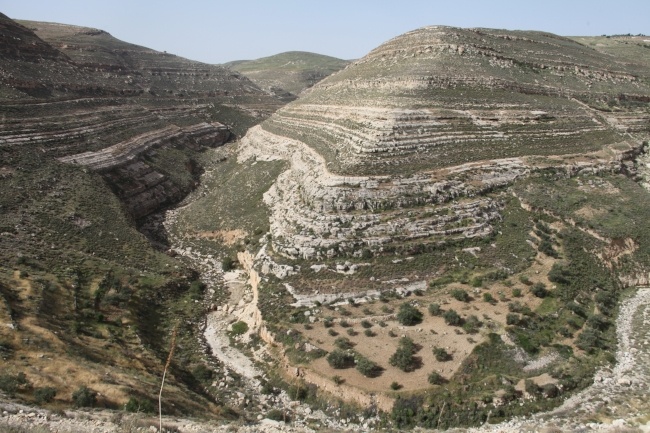
This is why we must decline all those sincere offers for tea—why over and over we must say, “Have a long life,” then wave and keep walking. So far, we have only made it halfway across the Hashemite Kingdom of Jordan, and there is a whole other half just waiting to surround us with all its beauty and surprise.
You do not need a long life to walk the Jordan Trail, but the Jordan Trail has made my life feel longer and larger than ever before. It has become the driving force in my life each morning, lifting me out of my sleeping bag and lacing up my boots, marching me up the next hill. Now I know that there is so much more to see and to live—so much that I must keep walking.
Follow my personal adventure on social media with #AndrewWalksJordan and #ThruJT and on the Andrew Walks Jordan homepage.

